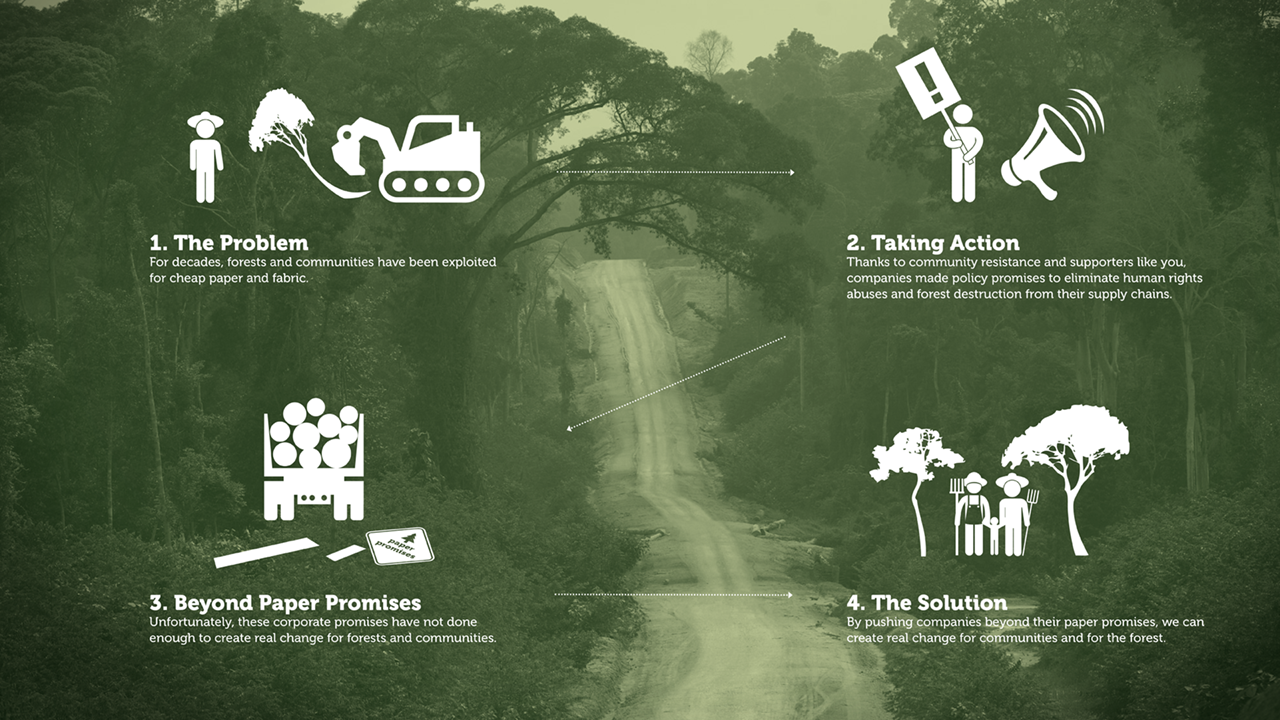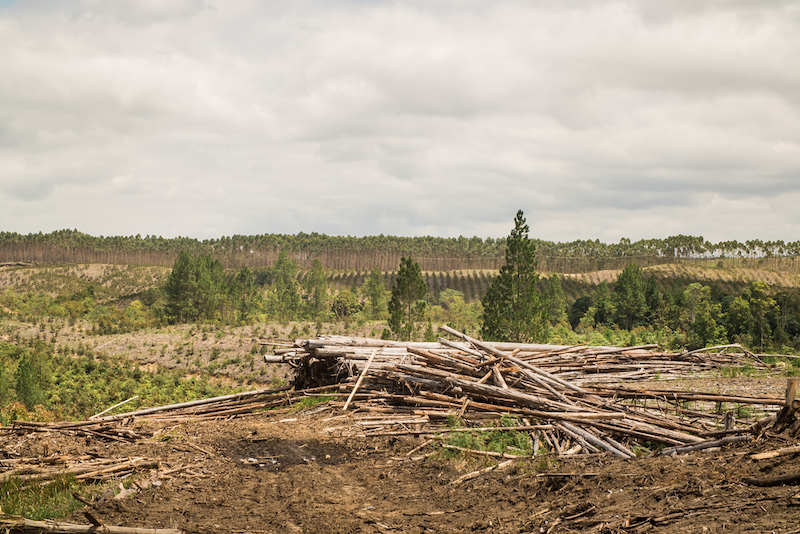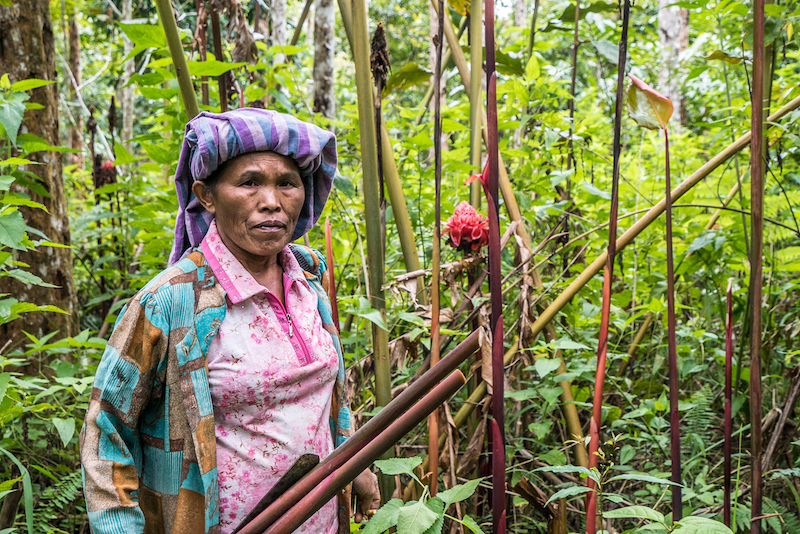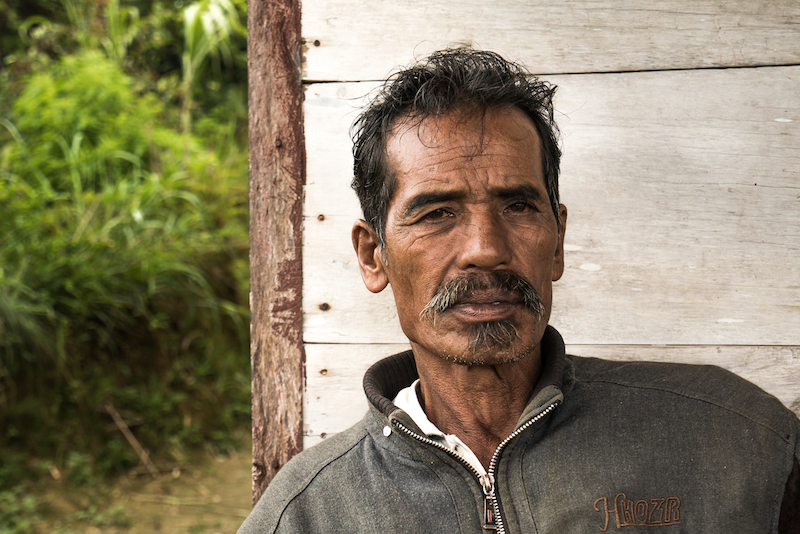The fate of Indonesia’s forests has been at the forefront of international concern for decades. These forests are known worldwide for their incredible biodiversity, their significance to our global climate, and their importance to the Indigenous and frontline communities who depend on them.
 How to move beyond paper promises to create real change for communities and for the forest.
How to move beyond paper promises to create real change for communities and for the forest.
In recent history, the main driver of deforestation in Indonesia has been the development of industrial pulpwood and palm oil plantations, which has cleared diverse natural forests and peatlands and converted them to massive monoculture plantations. Most often, these plantations are developed on the traditional and customary lands of Indigenous and local communities without their consent.
 This pulp and paper plantation run by Toba Pulp Lestari (TPL) was once an ancient rainforest traditionally owned by Indigenous communities. Learn more
This pulp and paper plantation run by Toba Pulp Lestari (TPL) was once an ancient rainforest traditionally owned by Indigenous communities. Learn more
This global concern has sparked public campaigns focusing on these commodities and their supply chains to US and international markets. These campaigns have worked to prevent further deforestation and human rights abuses, and to address the legacy of social and environmental harm that these commodities have caused. Groups like Rainforest Action Network and many others have worked to educate the public, policy makers, and companies throughout the supply chain about deforestation, climate impacts, land grabbing and human rights impacts and what companies can do to help address these problems.
 Indigenous and frontline communities depend on the forests for their food and livelihoods. Photo of Timura br. Siregor, an Indigenous Batak woman, in Nagasaribu, North Sumatra, Indonesia. Learn more
Indigenous and frontline communities depend on the forests for their food and livelihoods. Photo of Timura br. Siregor, an Indigenous Batak woman, in Nagasaribu, North Sumatra, Indonesia. Learn more
RAN’s Pulp and Paper campaign, launched in 2009, has profiled the adverse impacts and egregious practices of the major Indonesian producers of pulp, paper, and viscose—Asia Pulp & Paper (APP), Asia Pacific Resources International (APRIL) and Toba Pulp Lestari (TPL). These campaigns have called for end users—mostly popular brands—of pulp and paper, apparel, and other commodities driving deforestation, to adopt and implement responsible purchasing policies that are aligned with their values, and to use their influence to press for changes in the environmental and social policies and practices of the producers of these commodities. These campaigns have contributed to the adoption of “no deforestation, no peat, no exploitation” commitments from APP, APRIL and TPL, as well as purchasing policies from global brands such as Ralph Lauren, LBrands (Victoria’s Secret), Disney, Gucci, Tiffany’s, Victoria’s Secret, Nestle, HarperCollins, Office Depot, Nestle, Marks and Spencer, Ricoh and many others.

“The land is our life.”-Salamat Sianipar, a traditional leader in Nagasaribu, North Sumatra, Indonesia. Learn more
Despite these commitments, there still has not been sufficient change on the ground for forests, peatlands, or Indigenous and frontline communities. While progress has been made in stopping some forms of deforestation, pervasive and ongoing deforestation from third parties continues. Massive CO2 emissions and fires from the unsustainable system of agriculture that requires drainage of peatlands to establish plantations remain a hallmark of the industry. Widespread social conflict with local communities over land and resources still plague the industry as well. In addition, the legacy of harm to the environment and to communities who have lost land and livelihoods has yet to be addressed. Despite initial progress in slowing deforestation and forest degradation, the industry has expanded its manufacturing capacity beyond its ability to produce wood from plantations, creating intense pressure to expand and with it, new risks of harmful social and environmental impacts.
 “Let’s unite our will and strength, because if all farmers unite then nothing is impossible.” Sadili, Lubuk Mandarsah, Jambi Province, Indonesia. Learn more
“Let’s unite our will and strength, because if all farmers unite then nothing is impossible.” Sadili, Lubuk Mandarsah, Jambi Province, Indonesia. Learn more
It is vital that brands and other commodity buyers and their supply chain partners take responsibility for their commitments. The next challenge—and the real measure of these policies––is how they are implemented and whether or not they lead to real change on the ground. The Beyond Paper Promises campaign is focusing on amplifying the voices of communities on the frontlines in order to drive policy implementation to make sure that both buyers and suppliers follow through with their policy commitments and have independently verified, tangible and positive outcomes on the ground.
Join and read the stories, share the stories, and take action today!












